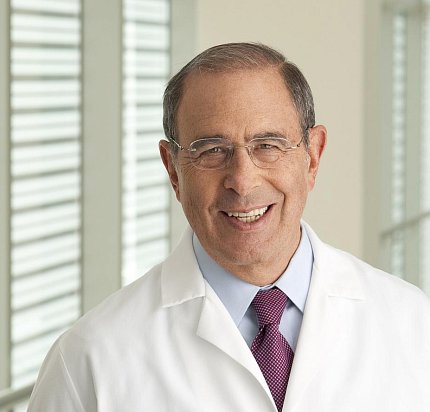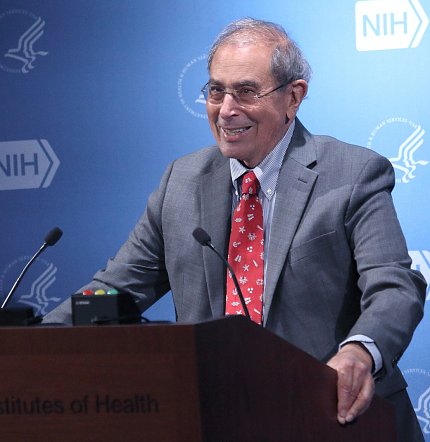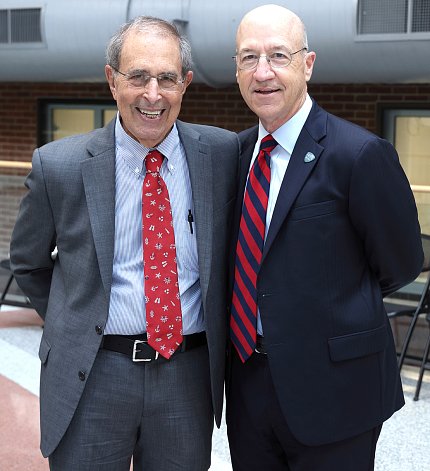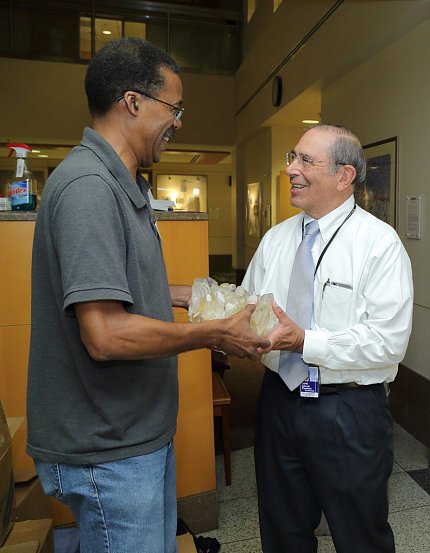NIH Mourns Loss of Former CC Director Gallin

Dr. John Gallin, the 10th and longest-serving director of the NIH Clinical Center (CC), died at his home on Oct. 10 of multiple myeloma with his wife Dr. Elaine Gallin by his side. He was 81.
Gallin’s illustrious career at NIH spanned more than 50 years, but he will be most remembered for leading NIH’s research hospital for 23 years from 1994-2017. He often said that his time at the CC was his most special because of the hospital’s partnership with patients.
“My father was passionate about NIH’s mission and how it has expanded the frontiers of biomedical research,” said Gallin’s daughter, Alice Gallin-Dwyer. “He was particularly devoted to the Clinical Center and its role helping patients, who often present with few other options, and that is why he called it the ‘House of Hope.’ He was honored to serve as its director for over two decades.”
Gallin developed the CC’s research portfolio, created the Patient Advisory Group and established the Department of Bioethics. He was instrumental in the creation of the Edmond J. Safra Family Lodge for adult patients and their families, a complement to the Children’s Inn at NIH.

Photo: Chia-Chi Charlie Chang
He also led efforts to build the addition to the hospital, the Mark O. Hatfield Clinical Research Center, which opened to patients in 2005. He started the Bench-to-Bedside Awards to integrate the work of basic and clinical investigators. His years of work led to the CC receiving the 2011 Lasker-Bloomberg Public Service Award.
One of his greatest passions was training the next generation of clinical researchers. In 1995, he created a curriculum in clinical research that started as a seminar with 15 students and today reaches 25,000 students in 168 countries annually. In 2018, the Gallins personally launched and funded the Trailblazer Prize for Clinician-Scientists at the Foundation for the National Institutes of Health. The prize is awarded to early-career clinician-scientists whose work has the potential to, or has led to, innovations in patient care.
Gallin was born in 1943 in New York City. He graduated from Amherst College and earned his M.D. from Weill Medical College of Cornell University. He then completed his residency at New York University’s Bellevue Hospital. He joined NIH in 1971 for postdoctoral training in basic and clinical research in infectious diseases in the National Institute of Allergy and Infectious Diseases (NIAID), where he and his close friend, former NIAID Director Dr. Anthony Fauci, were mentored by Dr. Sheldon “Shelly” Wolff.

Photo: Chia-Chi Charlie Chang
In 1976, he became a senior investigator and went on to serve as NIAID’s scientific director for intramural research activities and the founding chief of NIAID’s Laboratory of Host Defenses. Later in his career, Gallin served as the NIH associate director for clinical research where he oversaw CC independent investigators, clinical research training and the scientific review process for all clinical protocols at the NIH. He also served as the chief scientific officer of the CC where he provided leadership for ongoing research, oversaw the research budget process and developed policies and procedures for the scientific review of all intramural clinical protocols, research funding opportunities and the CC Board of Scientific Counselors. He retired from NIH in March 2023.

Photo: Ernie Branson
Throughout his career, Gallin remained committed to his own research on rare immune disorders of phagocytes, with a focus on chronic granulomatous disease (CGD). His laboratory described the genetic basis for several forms of CGD and other disorders of phagocytes and did pioneering research that has reduced life-threatening bacterial and fungal infections in patients with these disorders. Gallin was a member of the National Academy of Medicine, the Association of American Physicians, the American Society for Clinical Investigation, the American College of Physicians (Master) and the Royal College of Physicians of London.
“John left an incredible legacy that lives on in the important work at the NIH Clinical Center and in generations of clinician-scientists,” said NIH Director Dr. Monica Bertagnolli. “On behalf of NIH, I extend our deepest condolence to his wife Elaine, his two children Alice and Michael, and the rest of his family, friends and colleagues. John was a treasure and will be greatly missed.”

Photo: Chia-Chi Charlie Chang
